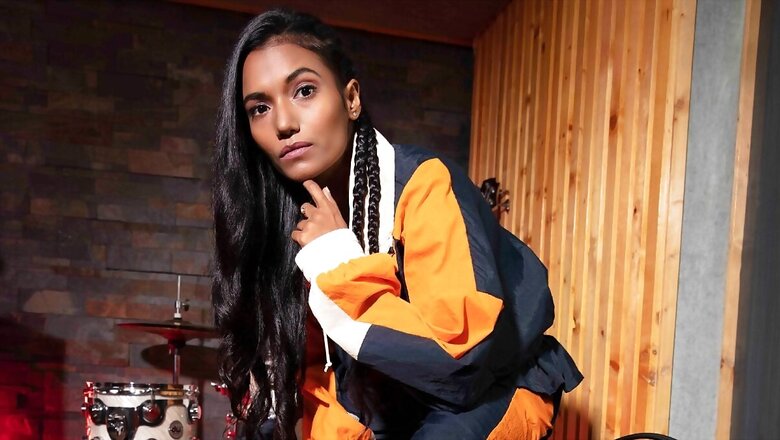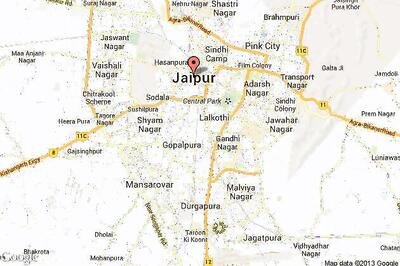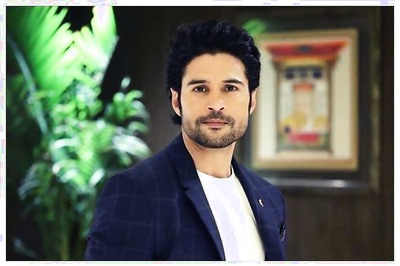
views
Deepa Unnikrishnan aka Dee MC is a renowned artist known for her work as a rapper, singer-songwriter, and storyteller within the music industry. For the last seven years, rap music has been her primary focus. Her venture into the world of rap and hip-hop began at the age of 19 when she delved into writing lyrics.
Following the release of her debut full-length album, “Dee=MC2,” in 2019, Dee MC garnered widespread critical acclaim. Her meticulous and dedicated approach to her artistry has resulted in projects that are not only genuine and motivational but also eloquent in presenting progressive viewpoints.
One of Dee’s notable contributions to the entertainment world was her involvement in the movie ‘Article 15,” which hit theaters in 2019. With a background in the Kollywood industry, Dee MC’s artistic talents have graced Tamil-language films. Furthermore, she showcased her expertise as a judge on Hustle 2.0, sharing the panel with King, EPR, and Dino James.
Dee MC was one of the Hip-Hop artists to come on board for Royal Stag BoomBox’s latest season, that aims to blur the lines between Bollywood music and Hip-Hop. She exclusively spoke with News18 Showsha and talked about the Hip-Hop scene in India, her influences and more.
Here are the excerpts:
Royal Stag Boombox created a unique blend of Bollywood and Hip-Hop, what drew you to this project and what can fans expect from your participation this year?
I am very excited to do my bit in this collaboration with Royal Stag Boombox, which is bringing the rhythm of Hip-Hop and the melodies of Bollywood together. I am definitely ready to bring my power-packed lyricism, and whatever the vibe of the song, I am sure I will fit into it effortlessly.
The project brings together artists from diverse musical backgrounds. How was it collaborating with other artists for Royal Stag Boombox and how did these interactions influence your contributions?
The collaboration bits have not happened yet. That is the second half of this project. Right now, today, I am going on stage, doing my live performance, so I am super-excited about that. But at the same time, I am really looking forward to the collaborative side of the project, because when like minded musicians join the studio together, magic comes out.
The interest in the Hip-Hop genre has grown immensely among Indian listeners in the last few years. Do you feel as a genre it has impacted Bollywood music as a whole? What are your thoughts on this?
I think Bollywood music has always evolved with time and trend. It has been very accepting of the different genres, which are popping up, basically. For the longest time, the kind of Hip-Hop you heard through Bollywood was a certain kind of music. But with the emergence of Hip-Hop, I think that also changed where a wider acceptance was given to different kinds of rappers. Like, earlier on probably we were looked at people who were fillers in a bigger song, now we are looked at as equal collaborators.
Royal Stag Boombox aims to bring unforgettable experiences to India’s youth. What message do you hope they take away from your performance in music?
Today’s performance and the message behind it is very much to go hard, rage all you want, but know when to slow down, know when to count your blessings and tell yourself that every single day I am doing my best and my best is enough.
Can you share with us a little bit about your journey and how your hometown, Kalyan, has influenced your music?
My journey is definitely very vast, can’t really sum it up in two-three sentences. But my journey as an artist began when I was five years old, because I have been on stage since I am five years old, dancing Bharatanatyam, and then I eventually started learning Hip-Hop dance, and I used to write poems in school. Hip-Hop was just supposed to happen to me. I think I was just doing it in bits and pieces. The rhythm came from Bharatanatyam and the lyrical ability came through poetry and stuff. Everything culminated together to become a Hip-Hop artist. I think I was always destined to become a Hip-Hop artist.
Who were your musical influences growing up and how have they shaped your approach to Hip-Hop?
Can’t really say growing up because at that time there wasn’t much, you know, influence of Hip-Hop. But in my late teenage years and my early 20s, I really fell in love with Hip-Hop and I researched a lot about it. The storytelling aspect of Hip-Hop is what, you know, encouraged me the most. To name a few artists, people like Jay-Z and Moss Def and Nicki Minaj were some of my earlier influences. But now I wouldn’t say I am influenced by any one particular artist. I am just influenced by artists in general, who are very ziddi and they never give up.
Can you walk us through your creative process? How do you go from an idea to a finished song?
Most of the times, there always is an idea in place. If not, then it literally is something called as free verse when it comes to Hip-Hop. If there is no particular concept or idea, then it’s just about whatever thoughts come into our head we just write it down. Then, it becomes a free verse, jo jyada soch ke nahi likha hai, immediately likha gaya hai, versus a properly thought-out song or an EP or an album, which is something I like doing, I like giving like a start to end kind of a journey. Like I told you, I fell in love with the storytelling side of Hip-Hop. It’s very important for me to have some sort of imagery in my songs, where people could just close their eyes and imagine what I am singing.In your work, you often tackle complex social issues.
How do you balance delivering a powerful message while ensuring that your music remains accessible and engaging?
I think I rely on things like humor or mixing in melody when it comes to delivering a message, which could otherwise sound preachy. I try not to be like, ki, you know, oh, I am teaching you how to do this. It’s basically just about putting forth my perspective. People are free to take what resonates with them.
You have managed to maintain your authenticity while working with brands. What’s your advice for artists on navigating brand partnerships without compromising on their art?
It very much is about working in collaboration to let the brand know what you are comfortable and what you are not comfortable to begin with and brands are also very, very receptive to that. In any campaign, the brand already has a very good idea of why they are taking the particular artist that they are taking. They have already seen that you fit their messaging in a certain type of way. I have through experience learned to, you know, work with them to deliver the best possible outcome. For instance, I really reflect on the messaging that is being sent out through Royal Stag Boombox which is to live at large, but also to live in the moment. I really resonate with that.
Songs like Chaar Logo Ki Baatein and Rang tackle different social issues. What drives you to use your platform to speak on these topics?
I think that what sets Hip-Hop as a genre apart from everything else because the whole power is in our penmanship. It literally boils down to me and my voice. Voicing out, you know, for N number of things come naturally to me. Definitely I have progressed, and my broader themes of my music have changed now, but Chaar Logo Ki Baatein and Rang come from an era where I was a bit of an angry Indian citizen who felt the need to question the way the system is. But now I am in a space
where I am trying to work with the system as much as possible, but without compromising on my principles. In Vadhiyaan, you address the violence faced by minorities and women with outspoken political opinions.
How important is it for artists to voice out against injustice in your view?
Like I said, everything you do should come from within you, you shouldn’t really feel the pressure to be the poster child of feminism. This is something I have realized in my own journey that it is not a woman’s responsibility to talk about women’s rights. But that goes beyond saying, because someone only talks about something when it really affects them. But at the end of the day, Hip-Hop really is about speaking from your own experience. If you have experienced things that you
really want to put out there, you should go for it.
Peace of Mind discusses the pressures of commercial interests on artistic creation. How do you personally define success?
I think that is the messaging of Royal Stag Boombox which means that I am living at large, I don’t necessarily need to look at my life as a series of checklists of achievements. Now, life really has become about living in the moment and being thankful for even the smaller graces provided by the universe. Everything culminates together to become one large thing.
What advice would you give to young independent artists struggling to find their voice in a commercialized industry?
It’s easier said than done, but really the process never ends till you quit. Nobody can take music away from you till the time you yourself quit. My suggestion would be to have a very clear understanding of why you are doing this and have multiple plans in place. Like in my own journey, I had done this where I didn’t want the pressure of earning money to completely fall on my music. I would really suggest having multiple sources of income, especially in a country like India where infrastructure for musicians is not completely set yet. Don’t start off with the expectation that everything will be roses. There will definitely be thorns along the way. But unless you quit, the journey never ends.
How has your music evolved since your debut album Dee=MC² and what themes or issues are you looking to explore in your future work?
I think today’s performance is a perfect example of that where you can see the way my sound has progressed, now my songs have very much a lot of melodies in it.
Given your influential role in nurturing the Hip-Hop community, how do you see the future of Hip Hop in India, particularly for female artists?
The future is here. The future is female and it already is here.
Looking back at your career so far, how do you hope your legacy in the Hip-Hop community will look like?
Legendary. I am very confident in the goals that I have laid out for myself. Whatever I envision in the first five years, I see it take shape in front of me in the next five years. I consider myself as an artist who is ahead of time. I would definitely love to be remembered as someone who has the ability to really represent Indian Hip-Hop on an international level.
You have been a source of inspiration for many. Who are some emerging artists that you believe are pushing the boundaries of Hip-Hop in interesting ways?
A few names off the top of my head would be Srushti Tawade, Uday Pandhi, Saurabh Abhyankar. These are all artists who I have met through Hustle. It’s really refreshing to see artists from different walks of life, who you may or may not have even heard before. But definitely by not putting themselves in a box, they are already pushing this genre ahead.



















Comments
0 comment